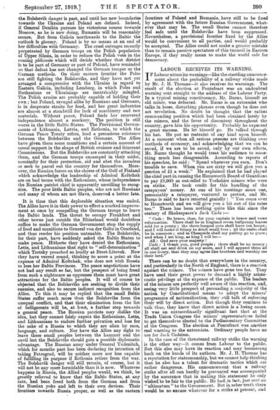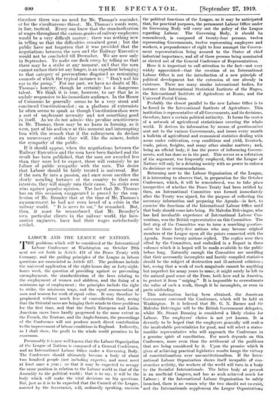LABOUR RECEIVES ITS WARNING.
IF Labour utters its warnings—like the startling announce- ment about the probability of a railway strike made by Mr. J. H. Thomas—it also receives its warnings. The result of the election at Pontefract was an undoubted warning sent straight to the address of the Labour Party. In a typical milling, constituency, Mr. Burns, himself an old miner, was defeated. Mr. Burns is an extremist who talks in loose, disturbing phrases even though he does net act revolution. No doubt he thought that the rather commanding position which had been obtained lately by the miners, and the fever of discontent throughout the country, gave him his opportunity. Probably he expected a great success. He let himself go. He talked throu his hat. He put no restraint of any kind upon hims At a moment when all serious persons are thinking over methods of economy, and acknowledging that we can be saved, if we are to be saved, only by our own efforts, Mr. Burns thought he would treat his audience to some- thing much less disagreeable. According to reports of his speeches, he said : Spend whatever you earn. Don't trouble to save. When you are sixty we will give you a pension of £1 a week." He explained that he had played the chief part in causing the Hemsworth Board of Guardians to pay £8,000 as out-relief to Yorkshire miners who were on strike. He took credit for this handling of the ratepayers' money. At one of his meetings some one, presumably a ratepayer, ventured to protest, and Mr. Burns is said to have retorted genially : " You come over to Hemstvorth and we will give you a bit out of the rates too." There has been nothing quite like this since the oratory of Shakespeare's Jack Cade :— " Cade : Be brave, then, for your captain is brave and vows
reformation. There shall be in England seven halfpenny loaves sold for a penny ; the three-hooped pots shall have ten hoops ; and I will make it felony to drink small beer ; all the realm shall be in common ; and in Cheapside shall my palfrey go to grass ; and when I am king, as king will be-
: God save your majesty 1 Cade : I thank you, good people ; there shall be no money ; all shall eat and drink on my score, and I will apparel them all in one livery, that they may agree like brothers and worship me their lord."
There can be no doubt that everywhere in the country, and particularly in the North of England, there is a reaction against the millers. The miners have gone too far. They have used their great power to demand a highly aristo- cratic privilege at the expense of the public. The leaders of the miners are perfectly well aware of this reaction, and, seeing very little prospect of persuading a majority of the nation by Constitutional means to adopt the miners' programme of nationalization, they still talk of enforcing their will by direct action. But though they continue to talk thus, they know that direct action is a losing cause. It was an extraordinarily significant fact that at the Trade Union Congress the miners' representatives failed to get themselves elected to the Parliamentary Committee of the Congress. The election at Pontefract was another real warning to the extremists. Ordinary people have no use for Jack Cadeism.
In the case of the threatened railway strike the warning is the other way—it comes from Labour to the public. But this also may have its reaction and may boomerang back on the heads of its authors. Mr. J. H. Thomas has a reputation for statesmanship, but we cannot help thinking that he also has a talent for dramatic tactics which are rather dangerous. His announcement that a railway strike after all can hardly be prevented was accompanied by the assurance that in making this statement he only wished; to be fair to the public. He had, in fact, just sent an "ultimatum" to the Government. But in sober truth there would be no excuse whatever for a strike at present, and therefore there was no need for Mr. Thomas's reminder, or for the simultaneous threat.. Mr. Thomas's words were, in fine, tactical. Every one knew that the standardization of wages throughout the various grades of railway employees would be a very difficult matter ; there was nothing new in telling us that the difficulties remained great ; but the public have not forgotten that it was provided that the negotiations between the men and the Railway Executive would not be concluded till December. We are now only in September. To make our flesh creep by telling us that there may be a strike at any moment, and that the men cannot endure their lot any longer, is an expedient belonging to that category of provocations disguised as restraining counsels of which the typical instance is : " Don't nail his ear to the pump." For our part, we have no doubt of Mr. Thomas's honesty, though he certainly has a dangerous talent. We think it is true, however, to say that he is unduly responsive to his immediate audience. In the House of Commons he generally seems to be a very stout and convinced Constitutionalist ; on a platform of extremists he often seems to speak as though Constitutionalism were a sort of unpleasant necessity and not something good in itself. As we do not admire this peculiar sensitiveness in Mr. Thomas, there may be no harm in forming, as it were, part of his audience at this moment and interrupting him with the remark that if the railwaymen do declare an unnecessary strike they will, like the miners, forfeit the sympathy of the public.
If it should appear, when the negotiations between the Railway Executive and the men have been finished and the result has been published, that the men are awarded less than they were led to expect, there will certainly be no failure of public sympathy with the men. The desire that Labour should be fairly treated is universal. But if the men fly into a passion, and once more sacrifice the slowly mending fortunes of the country to their own interests, they will simply ruin their cause. No strike ever wins against popular opinion. The fact that Mr. Thomas has on this occasion exaggerated is proved by the con- fession of Mr. Bromley that at the time of Mr. Thomas's announcement he had not even heard of a crisis in the railway world. " It is news to me," he remarked. But, then, it must be remembered that Mr. Bromley's own particular clients in the railway world, the loco- motive engineers, have had their wages satisfactorily s :Ailed.



































 Previous page
Previous page